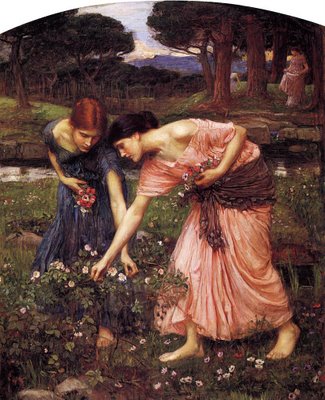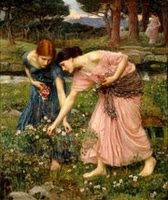
Countess Ellen Olenska from Edith Wharton’s The Age of Innocence, a controversial character, full of passion & brute honesty. Newly arrived from Europe, where she has presumably left her husband, she arrives in New York to face the gossip & brutal criticism of its citizens. Amongst them is her cousin May & her fiancé Newland Archer. Ellen is like no one Newland has ever met; all his convictions (including his love for May) are suddenly thrown into doubt. And the high society of upper class New York which he once found so engaging becomes vacuous & dull. A rapturous love develops between Ellen & Newland, a love quelled by an unforgiving world, a world where rules reign over truth.
The Age of Innocence was the winner of the 1921 Pulitzer Prize - the first Pulitzer ever awarded to a woman. The following passage is one of my favourites:
When the men joined the ladies after dinner the Duke went straight up to the Countess Olenska, and they sat down in a corner and plunged into animated talk. Neither seemed aware that the Duke should first have paid his respects to Mrs. Lovell Mingott and Mrs. Headley Chivers, and the countess have conversed with that amiable hypochondriac, Mr. Urban Dagonet of Washington Square, who, in order to have the pleasure of meeting her, had broken through his fixed rule of not dinning out between January and April. The two chatted together for nearly twenty minutes; then the Countess rose and, walking alone across the wide drawing-room, sat down at Newland Archer’s side.
It was not the custom in New York drawing-rooms for a lady to get up and walk away from one gentleman in order to seek the company of another. Etiquette required that she should wait, immovable as an idol, while the men who wished to converse with her succeeded each other at her side. But the Countess was apparently unaware of having broken any rule; she sat at perfect ease in a corner of the sofa beside Archer, and looked at him with the kindest eyes.
“I want you to talk to me about May,” she said
Instead of answering her he asked: “You knew the Duke before?”
“Oh, yes – we used to see him every winter at Nice. He’s very fond of gambling – he used to come to the house a great deal.” She said it in the simplest manner, as if she had said: “He’s fond of wild-flowers”; and after a moment she added candidly: “I think he’s the dullest man I ever met.”
**********
“May is a darling; I’ve seen no young girl in New York so handsome and so intelligent. Are you very much in love with her?”
Newland Archer reddened and laughed. “As much as a man can be”
She continued to consider him thoughtfully, as if not to miss any shade of meaning in what he said, “Do you think, then, there is a limit?”
The Age of Innocence was the winner of the 1921 Pulitzer Prize - the first Pulitzer ever awarded to a woman. The following passage is one of my favourites:
When the men joined the ladies after dinner the Duke went straight up to the Countess Olenska, and they sat down in a corner and plunged into animated talk. Neither seemed aware that the Duke should first have paid his respects to Mrs. Lovell Mingott and Mrs. Headley Chivers, and the countess have conversed with that amiable hypochondriac, Mr. Urban Dagonet of Washington Square, who, in order to have the pleasure of meeting her, had broken through his fixed rule of not dinning out between January and April. The two chatted together for nearly twenty minutes; then the Countess rose and, walking alone across the wide drawing-room, sat down at Newland Archer’s side.
It was not the custom in New York drawing-rooms for a lady to get up and walk away from one gentleman in order to seek the company of another. Etiquette required that she should wait, immovable as an idol, while the men who wished to converse with her succeeded each other at her side. But the Countess was apparently unaware of having broken any rule; she sat at perfect ease in a corner of the sofa beside Archer, and looked at him with the kindest eyes.
“I want you to talk to me about May,” she said
Instead of answering her he asked: “You knew the Duke before?”
“Oh, yes – we used to see him every winter at Nice. He’s very fond of gambling – he used to come to the house a great deal.” She said it in the simplest manner, as if she had said: “He’s fond of wild-flowers”; and after a moment she added candidly: “I think he’s the dullest man I ever met.”
**********
“May is a darling; I’ve seen no young girl in New York so handsome and so intelligent. Are you very much in love with her?”
Newland Archer reddened and laughed. “As much as a man can be”
She continued to consider him thoughtfully, as if not to miss any shade of meaning in what he said, “Do you think, then, there is a limit?”




















No comments:
Post a Comment